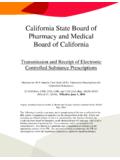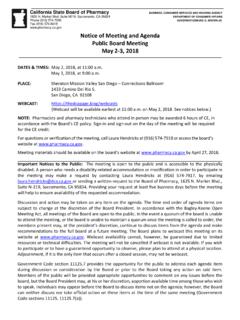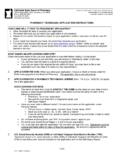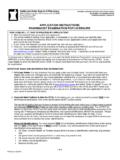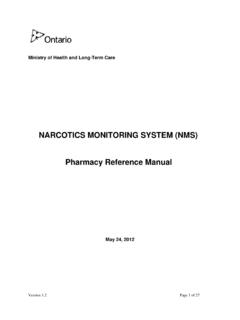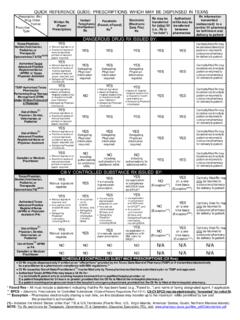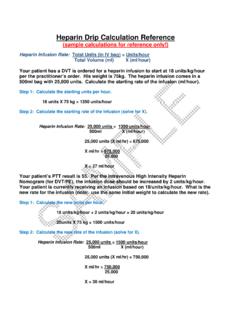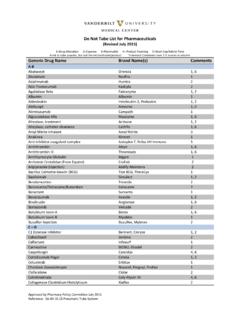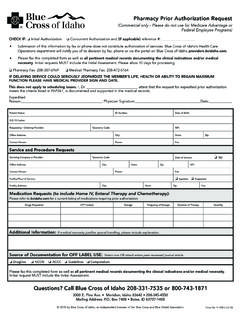Transcription of Pharmacy Law Changes for 2019
1 Statutory Changes to Pharmacy Law Unless otherwise noted, the provisions take effect January 1, 2020 Business and Professions Code Changes Section 209 of the Business and Professions Code is amended to read: The Department of Justice, in conjunction with the Department of Consumer Affairs and the boards and committees identified in subdivision (d) of Section 208, shall do all of the following: (a) Identify and implement a streamlined application and approval process to provide access to the CURES Prescription Drug Monitoring Program (PDMP) database for licensed health care practitioners eligible to prescribe, order, administer, furnish, or dispense Schedule II, Schedule III, or Schedule IV controlled substances and for pharmacists. Every reasonable effort shall be made to implement a streamlined application and approval process that a licensed health care practitioner or pharmacist can complete at the time that he or she is they are applying for licensure or renewing his or her their license.
2 (b) Identify necessary procedures to enable licensed health care practitioners and pharmacists with access to the CURES PDMP to delegate their authority to order access reports from the CURES PDMP. (c) Develop a procedure to enable health care practitioners who do not have a federal Drug Enforcement Administration (DEA) number to opt out of applying for access to the CURES PDMP. Section 480 of the Business and Professions Code, as amended by Section 3 of Chapter 995 of the Statutes of 2018, is amended to read: (a) A board may deny a license regulated by this code on the grounds that the applicant has one of the following: (1) Been convicted of a crime. A conviction within the meaning of this section means a plea or verdict of guilty or a conviction following a plea of nolo contendere. Any action that a board is permitted to take following the establishment of a conviction may be taken when the time for appeal has elapsed, or the judgment of conviction has been affirmed on appeal, or when an order granting probation is made suspending the imposition of sentence, irrespective of a subsequent order under the provisions of Section , , , or of the Penal Code.
3 (2) Done any act involving dishonesty, fraud, or deceit with the intent to substantially benefit himself themselves or herself or another, or substantially in jure another. (3) (A) Done any act that if done by a licentiate of the business or profession in question, would be grounds for suspension or revocation of license. California State Board of Pharmacy -Legislation and Regulations Committee Meeting November 5, 2019 Page 2 of 80 (B) The board may deny a license pursuant to this subdivision only if the crime or act is substantially related to the qualifications, functions, or duties of the business or profession for which the application is made. (b) Notwithstanding any other provision of this code, a person shall not be denied a license solely on the basis that he or she has they have been convicted of a felony if he or she has they have obtained a certificate of rehabilitation under Chapter (commencing with Section ) of Title 6 of Part 3 of the Penal Code or that he or she has they have been convicted of a misdemeanor if he or she has they have met all applicable requirements of the criteria of rehabilitation developed by the board to evaluate the rehabilitation of a person when considering the denial of a license under subdivision (a) of Section 482.
4 (c) Notwithstanding any other provisions of this code, a person shall not be denied a license solely on the basis of a conviction that has been dismissed pursuant to Section , , , or of the Penal Code. An applicant who has a conviction that has been dismissed pursuant to Section , , or of the Penal Code shall provide proof of the dismissal. (d) A board may deny a license regulated by this code on the ground that the applicant knowingly made a false statement of fact that is required to be revealed in the application for the license. (e) This section shall become inoperative on July 1, 2020, and, as of January 1, 2021, is repealed. Section 480 of the Business and Professions Code, as added by Section 4 of Chapter 995 of the Statutes of 2018, is amended to read: (a) Notwithstanding any other provision of this code, a board may deny a license regulated by this code on the grounds that the applicant has been convicted of a crime or has been subject to formal discipline only if either of the following conditions are met.
5 (1) The applicant has been convicted of a crime within the preceding seven years from the date of application that is substantially re lated to the qualifications, functions, or duties of the business or profession for which the application is made, regardless of whether th e applicant was incarcerated for that crime, or the applicant has been convicted of a crime that is substantially related to the qualifications, functions, or duties of the business or profession for which the application is made and for which the applicant is presently in carcerated or for which the applicant was released from incarceration within the preceding seven years from the date of application. However, the preceding seven-year limitation shall not apply in either of the following situations: (A) The applicant was convicted of a serious felony, as defined in Section of the Penal Code or a crime for which registration is required pursuant to paragraph (2) or (3) of subdivision (d) of Section 290 of the Penal Code.
6 California State Board of Pharmacy -Legislation and Regulations Committee Meeting November 5, 2019 Page 3 of 80 (B) The applicant was convicted of a financial crime currently classified as a felony that is directly and adversely re lated to the fiduciary q ualifications, functions, or duties of the business or profession for which the application is made, pursuant to regulations adopted by the board, and for which the applicant is seeking licensure under any of the following: (i) Chapter 1 (commencing with Section 5000) of Division 3. (ii) Chapter 6 (commencing with Section 6500) of Division 3. (iii) Chapter 9 (commencing with Section 7000) of Division 3. (iv) Chapter (commencing with Section 7512) of Division 3. (v) Licensure as a funeral director or cemetery manager under C hapter 12 (commencing with Section 7600) of Division 3.
7 (vi) Division 4 (commencing with Section 10000). (2) The applicant has been subjected to formal discipline by a licensing board in or outside California within the preceding seven years from the date of application based on professional misconduct that would have been cause for discipline before the board for wh ich the present application is made and that is substantially related to the qualifications, functions, or duties of the business or profession for which the present application is made. However, prior disciplinary action by a licensing board within the preceding seven years shall not be the basis for denial of a license if the basis for that disciplinary ac tion was a conviction that has been dismissed pursuant to Section , , , , or of the Penal Code or a comparable dismissal or expungement. (b) Notwithstanding any other provision of this code, a person shall not be denied a license on the basis that he or she the person has been convicted of a crime, or on the basis of acts underlying a conviction for a crime, if he or she that person has obtained a certificate of rehabilitation under C hapter (commencing with Section ) of Title 6 of Part 3 of the Penal Code, has been granted clemency or a pardon by a state or federal executive, or has made a showing of rehabilitation pursuant to Section 482.
8 (c) Notwithstanding any other provision of this code, a person shall not be denied a license on the basis of any conviction, or on the basis of the acts underlying the conviction, that has been dismissed pursuant to Section , , , , or of the Penal Code, or a comparable dismissal or expungement. An applicant who has a conviction that has been dismissed pursuant to Section , , , or of the Penal Code shall provide proof of the dismissal if it is not reflected on the report furnished by the Department of Justice. California State Board of Pharmacy -Legislation and Regulations Committee Meeting November 5, 2019 Page 4 of 80 (d) Notwithstanding any other provision of this code, a board shall not deny a license on the basis of an arrest that resulted in a disposition other than a conviction, including an arrest that resulted in an infraction, citation, or a juvenile adjudication.
9 (e) A board may deny a license regulated by this code on the ground that the applicant knowingly made a false statement of fact that is required to be revealed in the application for the license. A board shall not deny a license based solely on an applicant s failure to disclose a fact that would not have been cause for denial of the license had it been disclosed. (f) A board shall follow the following procedures in requesting or acting on an applicant s criminal history information: (1) A board issuing a license pursuant to Chapter 3 (commencing with Section 5500), Chapter (commencing with Section 5615), Chapter 10 (commencing with Section 7301), Chapter 20 (commencing with Section 9800), or Chapter (commencing with Section 9880), of Division 3, or Chapter 3 (commencing with Section 19000) or Chapter (commencing with Section 19225) of Division 8 may require applicants for licensure under those chapters to disclose criminal conviction history on an application for licensure.
10 (2) Except as provided in paragraph (1), a board shall not require an applicant for licensure to disclose any information or documentation regarding the applicant s criminal history. However, a board may request mitigating information from an applicant regarding the applicant s criminal history for purposes of determining substantial relation or demonstrating evidence of rehabilitation, provided that the applicant is informed that disclosure is voluntary and that the applicant s decision not to disclose any i nformation shall not be a factor in a board s decision to grant or deny an application for licensure. (3) If a board decides to deny an application for licensure based solely or in part on the applicant s conviction history, the board shall notify the applicant in writing of all of the following: (A) The denial or disqualification of licensure.

